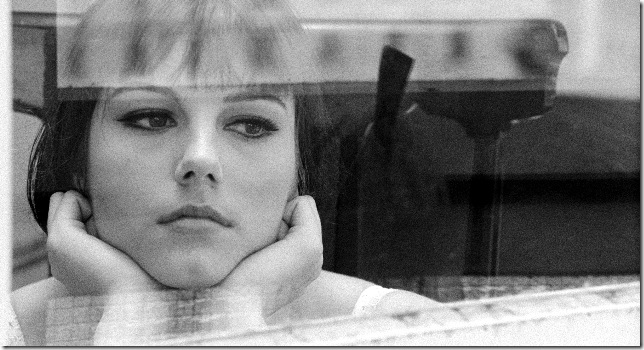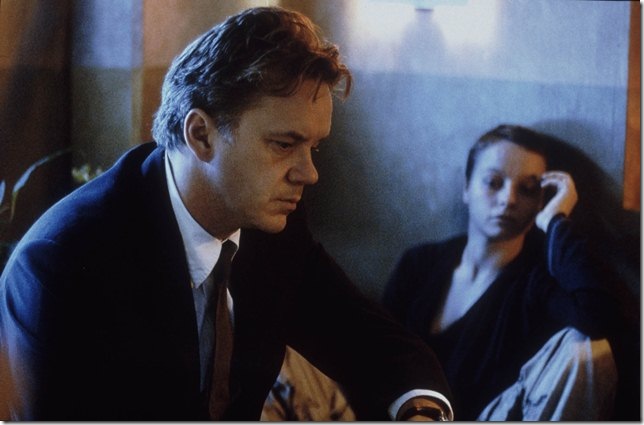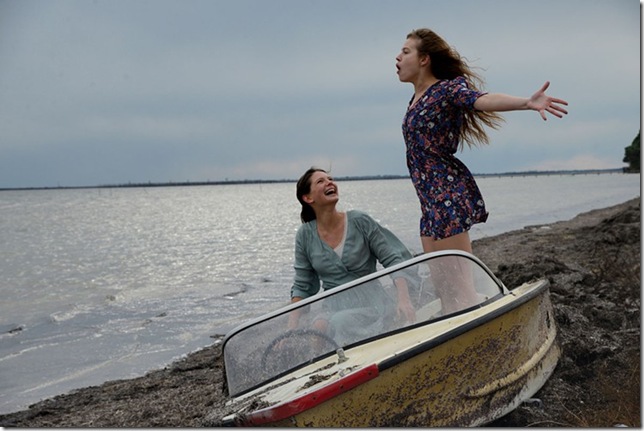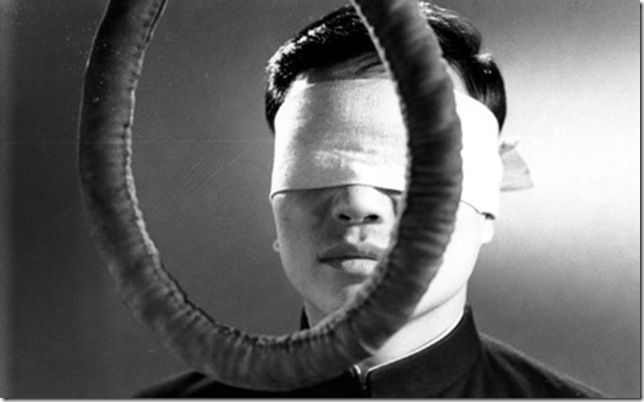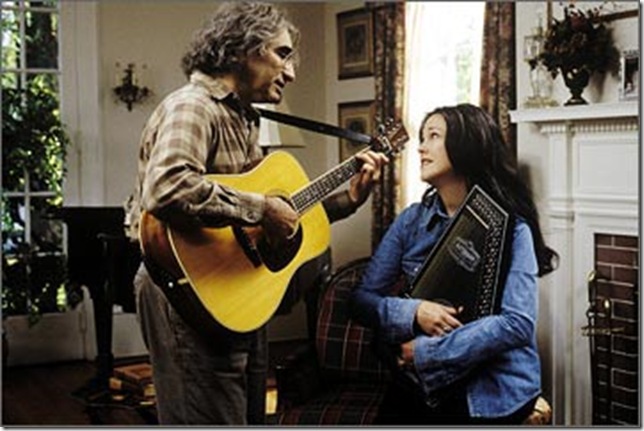Stefania Sandrelli in I Knew Her Well. (1965)
I Knew Her Well: The merciless, soul-crushing world of celebrity aspiration is at the core of director Antonio Pietrangeli’s 1965 inverse/repudiation of La Dolce Vita (Criterion, $26.19 Blu-ray, $19.69 DVD), which alternates between the blackly comic and beautifully dolorous. Stefania Sandrelli, still riding the box-office coattails of her breakthrough in Divorce Italian Style, is gifted with a more substantial role here as Adriana, a lovely young thing from provincial Tuscany who moves to Rome to pursue acting and modeling.
Sandrelli adopts the carefree air of Anna Karina at her peak, and Pietrangeli films her character’s life as a plotless succession of vignettes — a parade of nightclubs, film sets, fashion shoots, parties, speedboats and convertibles. But it’s less a progression that an endlessly repeating cul-de-sac, an oarless rut of exploitation, abandonment and carrots dangling just out of reach.
Sandrelli wears a different wig in nearly every scene, a decision that speaks volumes about her splintered character, who is willing to adopt whatever persona it takes to succeed in a given venture, be it behind a curtain or behind bedroom doors. Her promiscuity is presented as a necessary sacrifice in an industry where sex trumps money as the chief commoditization. “You’ll go to bed with just anyone,” her sister says. “You’re like the prize at a charity raffle.” When the police question her about the criminal she unwittingly slept with — a jewel thief, played by Jean-Claude Brialy, who left her with the hotel bill after their one-night stand — she tells the detective, “if you find him, tell him to call me, allright?” You don’t know whether to laugh or cry, and Pietrangeli’s film is likely to elicit both reactions throughout.
I Knew Her Well’s feminism is spot-on and preternaturally relevant. In a 2015 interview conducted for this disc, Sandrelli calls the film an “eternal story about the eternal feminine” forever catching up to the everyday reality awarded males in a patriarchal system. But the director’s sympathies extend to male characters in similar situations. Though she would never see it that way, Adriana’s striving compatriots are Mario Adorf’s second-rate palooka, whom she briefly befriends after he suffers another loss; and Ugo Tognazzi’s aging actor, who, like a performing monkey, is forced to nearly kill himself in a frenzied tabletop tap routine at a vapid industry party, to no benefit. They’re all desperately swimming through rivers of shame and embarrassment to grasp their small piece of an ever-shrinking pie.
Pietrageli directed just 11 features in a career cut short when he cinematically drowned while producing a film. If I Knew Her Well is any indication, he’s overdue for rediscovery.
Tim Robbins and Samantha Morton in Code 46. (2003)
Code 46: Falling in love in a science-fiction dystopia rarely ends well. So it goes with this cerebral and underappreciated Michael Winterbottom thriller from 2003 (Olive, $16.99 Blu-ray), in which Tim Robbins plays William Geld, a married insurance fraud investigator in an authoritarian near-future state. He discovers the culprit, Samantha Morton’s Maria Gonzalez, after a visit to a labyrinthine corporation called the Sphinx, but she sets his heart aflutter. Instead of turning her in, he goes to bed with her, a decision that unwittingly dooms their prospects: It turns out Maria shares the same genetic code as William’s mother, and laws against such “interbreeding” are enforced with draconian urgency.
Like Godard’s Alphaville, Winterbottom saved money by shooting in contemporary locations rather than building sets. He filmed Code 46 in Shanghai, Dubai and Rajasthan, discovering the futuristic gleam contained in the edifices of these emerging destinations. Winterbottom’s near-future is never less than plausible and even prescient, with characters communicating via video cellphone calls (anticipating FaceTime), entering every building with thumbprint recognition, and ingesting “viruses” to enhance performance in desired areas — functioning as an extension of today’s pharmaceuticals.
Everybody speaks English — calling to mind physicist Michio Kaku’s description of English as the “Type One” global language — but with snippets of Spanish, Arabic, French, Mandarin and other tongues, suggesting a polyglot future absent ethnic identity as well as ethnic division.
Admirably, Winterbottom spells none of this out, waiting patiently for us to catch up to his world and the Anthony Burgess-like words he invents (like “papelles” and “palabras”). Though the impossible love story is always foregrounded, Code 46 bristles with the political and moral implications of authoritarian rule, in which everything is surveilled, memory erasure is commonplace, and income inequality is vaster than ever. It’s an Orwellian nightmare that proceeds like a dream.
Joséphine Japy and Lou de Laâge in Breathe. (2015)
Breathe: This devastating sophomore feature directed by French actress Mélanie Laurent (Film Movement, $17.29 DVD) starts off as coming-of-age narrative and thunders nastily into a psychological thriller, with developments both shocking and elliptical. Charlie (Joséphine Japy) is an asthmatic and virginal 17-year-old girl who excels in academics and athletics despite her parents’ rancorous divorce. Everything changes when she meets a mercurial new student, Sarah (Lou de Laâge), who smokes like the Marlboro Man and smolders when she does it — and whose experience with feminine products, drugs, boys and life dwarfs Charlie’s provincial lifestyle. The two girls become inseparable, with Charlie growing more than smitten, until Sarah’s affections drift apart at a holiday party, and we begin to realize that, for Sarah, her new friend is as manipulable as putty and as disposable as a rag doll. As Charlie’s obsession deepens, everything else in her life falls apart.
Breathe is a harrowing look at unreciprocated infatuation. It pivots on Charlie’s desire to be wanted, loved and needed — to meet the person who would drop everything when you walked into the room — and charts the cascading tragedies that occur when reality fails to meet those expectations. Every classroom scene in the girls’ high school seems to reflect back on Charlie’s masochistic relationship to Sarah, from a philosophical debate about passion as both a form of liberation and an obstacle, to a video about how haustoria suck the life out of geraniums. Breathe is a welcome adolescent addition to the growing canon of twin-female psychodramas — Persona, 3 Women, Swimming Pool and so on — and it’s also one of the most unflinchingly accurate portraits of high school as a punishing cesspool of hormones, jealousy, guilt and anxiety. It’s enough to send just about anybody scrambling for an inhaler.
Do-yun Yu in Death by Hanging. (1968)
Death by Hanging: For much of its running time, this 1968 satire by Japanese provocateur Nagisha Oshima (Criterion, $26.19 Blu-ray, $19.99 DVD) plays like a Twilight Zone premise gone rogue, complete with the series’ occasional descent into moral hectoring. It begins like an educational documentary on the process of capital punishment in Japan: coldly clinical sentences meted out in spartan, anonymous buildings.
A voice-over narrator bloodlessly explains procedure while a group of government officials prepares a criminal for execution. It becomes a vivid fiction after the man subjected to the hanging miraculously survives, first as a persistent heartbeat, then with full consciousness, albeit with a case of vacant-eyed amnesia.
At this point, his executioners — bumbling government officials, an earnest chaplain, legal experts suddenly in over their heads — scramble for a new justification to re-hang the prisoner. Hairs are split and debates over the ethics of executing a man who is now “mentally incapacitated” rage among the bureaucrats, who try in vein to explain to the man, a convicted double-rapist and murderer, his sentence. Their byzantine (il)logic leads to outrageous reenactments of his crimes among these supposedly upstanding moral arbiters, many of them finding perverse thrills in their Dionysian performance art. These poorly acted sexual “assaults” are both hilarious and unsettling — and speak volumes about the hypocrisy and repression in Japanese culture.
Death By Hanging is spot-on for its first hour of tightly visualized, brazenly incorrect satire, and it still carries some residual wit and elegant visual poetry into its second half. But once the tone shifts into didactic sermonizing, it never returns to its former brilliance. Brechtian title cards, a possibly real/possibly imagined woman in the absurdist spirit of Buñuel or Ionesco, direct-camera addresses implicating the audience, and heavy-handed lectures on the mistreatment of Korean immigrants dwarfs more universal questions about the ethics of capital punishment and the definition of identity. By the time the convicted rapist achieves a Christ-like level of sacrifice, the film has made its point. And made it again. And made it once more. Still, it’s a confrontational work that is hard to pigeonhole: Even its failing half is interesting on a number of levels.
Eugene Levy and Catherine O’Hara in A Mighty Wind. (2003)
A Mighty Wind: Christopher Guest’s new-to-Blu-ray fifth feature (Warner, $16.99) both celebrates and eviscerates the diminishing niche of folk music in the 21st century. Shot in the director’s preferred pseudo-documentary, improv-friendly approach, it chronicles the preparation for, and performance of, a tribute concert honoring an influential folk impresario.
Baby Boomer folkies like the purist Folksmen trio (Harry Shearer, Michael McKean and Guest), the complicated former lovers Mitch and Mickey (Eugene Levy and Catherine O’Hara), and the reformed nine-piece the New Main Street Singers (led by original member Paul Dooley) dust off their mothballed sound for a live triple-bill to be broadcast on public television.
The jokes are not as inspired or as rapid-fire as top-shelf Guest products like Best in Show or This is Spinal Tap, but the observations and attention to detail can be witheringly spot-on, from the aging folksters’ appearances — alopecia, Amish beards, antiquated hippie togs — to their lovably bad album covers and less-than-enviable gigs in front of roller coasters and slot machines.
These are people vainly clutching at former glories, but Guest leaves room among the outsized mockery to recognize the healing power of folk music, which rescued many of the characters from hurt, heartache, prostitution and anonymity. A Mighty Wind is slight, but it’ll occasionally leave you stunned by its unexpected tenderness. And the music’s great, too.
